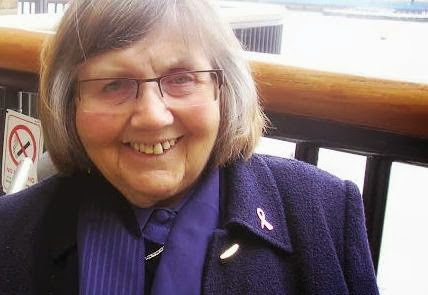Euthanasia or Assisted Dying
As a child I was issued with more than one death
sentence. The most memorable and
traumatic came at the age of six. Not
having seen my parents for many months, as visitors were not allowed in those
days, the Ward Sister stood at the end of my bed and pronounced. 'You are going
to die. Your Mummy and Daddy are coming
to see you but you mustn't tell them because you will upset them. They're coming at 2 o'clock.' I was all too aware of the ward clock and the
time I had to try and digest what she had said before they arrived. On arrival, Sister produced two chairs for my
visitors. Before she sat down,
Mother leaned over me, kissed me and put a colouring book and box of pencils on
the sheet. I clearly remember thinking,
'I should tell her to take them home because I won't be able to use them.' but
I kept that thought to myself because I didn't want to upset her and Sister
would be angry with me. She was a formidable force to be reckoned with as
I had learned on other occasions.
Belgium has just passed a law that enables children aged
twelve and over, together with parents and professional individuals to take the
decision to terminate life. 'Euthanasia'' or the more familiar phrase
'assisted dying,' means that children deemed terminally ill and/or disabled and
perceived as having little chance of an acceptable quality of life can be
killed. Anybody seeing me in the condition I was in between the ages of
four and eighteen years might also have come to that conclusion.
Despite a growing number of countries debating the pros and
cons of the issue, there is public inertia when it comes to refuting the
passing of these laws and, in some countries extending criteria to cover
children. Instead of being front page news euthanasia is buried deep inside the
national newspapers. Maybe people feel threatened by the fact they are
continually confronted with news of diminishing resources so people who are
able, currently support themselves by operating in survival mode. There may be
an underlying fear that the more people who need health and social care
services the greater will be the added strain on what may be perceived as a dwindling
economy and thus further diminish the quality of their lives. Could this
be the cause of the inertia or disinterest?
I am well into my seventies. I have had a quality later life having worked,
travelled, enjoyed family and Church life and life in general. I thank God that those people around me in my
early years saw fit to try and give me a reasonable quality of life, despite
serious illness and impairment. Not all
felt I had a life worth living and that l learned second-hand in medical settings,
but some did, and I am grateful that they took that approach even in
those earlier and often darker times. Members of the public have said to
me on occasions, 'I don't know how you can live like that, I couldn't stand
it,' or words to that effect. Maybe I had less of the struggle that some
youngsters have today through advanced medical and surgical treatments, but
mistakes are made. Decisions that take a life cannot be retracted. While it is
a highly emotive issue, and I in no way wish to minimise or underestimate the
complex and confusing circumstances in which families are situated and the
often agonising decisions to be made by them and those in health and social
care settings, killing is not the answer. Irrespective of all the
wrestling and soul-searching, a life terminated cannot be reversed.
Life-threatening decisions are often taken because people
experience extreme pain. It is not the only issue, but there are many settings
in which the knowledge, skills, and equipment to deal with pain are lacking or
missing. I do have considerable experience
of intractable pain levels and I have been fortunate to eventually meet with
the people who do have the knowledge, skills and experience.
While people have the right to make choices and
decisions, many decisions are made and taken without the relevant knowledge and
information, with people available who have the lived and professional
experience. There is a history of taking the lives of ill and disabled
children and adults whom others have deemed fit only for experiment and
ultimately untimely death. The life deemed not worth living might turn out to
be a life very much worth living. I, and
others, have lived to prove it.
Ann Macfarlane
February 2014
